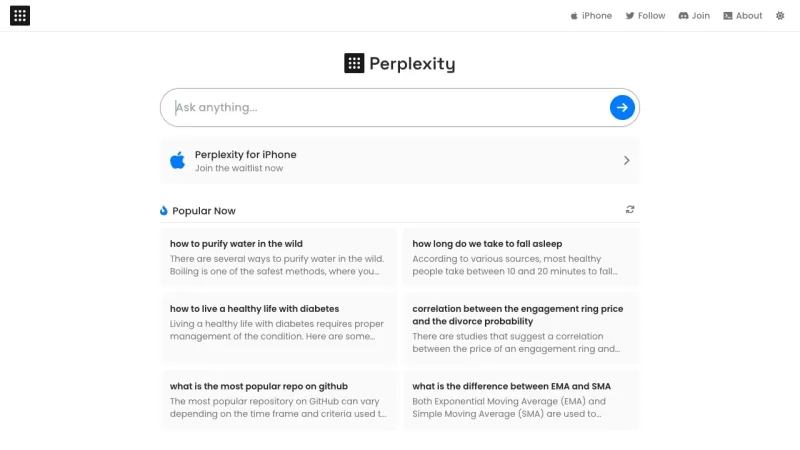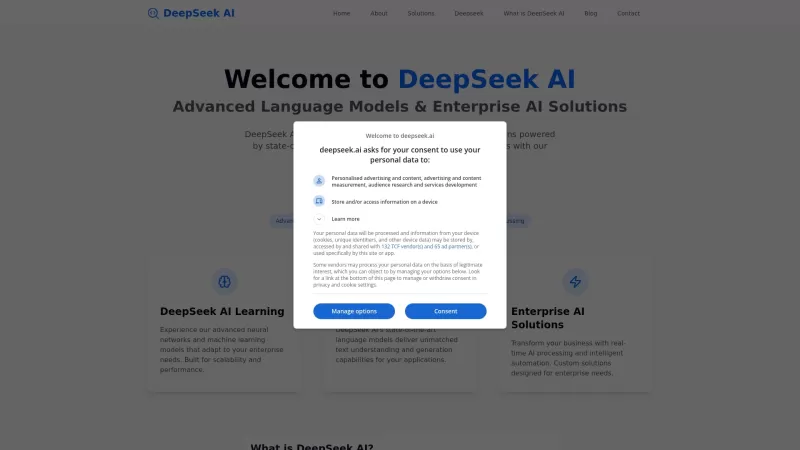Davos 2025: Navigating Trump's Return and Global Economic Shifts

 April 27, 2025
April 27, 2025

 HaroldMiller
HaroldMiller

 6
6
Davos 2025 was a spectacle of snow-capped mountains, world leaders, and economic giants, but the real buzz was about the return of a familiar face: Donald Trump. His second inauguration as US President and his virtual address to the forum set the stage for a reevaluation of global trade, security, and the future of international relations. It was clear from the get-go that this wasn't going to be just another Davos. This article dives into the key discussions and insights from the event, exploring the impact of Trump's return, the AI revolution, and how global leaders are navigating this new era.
Key Points
- Trump's Comeback: Trump's second term as President was the elephant in the room, steering the conversation at the World Economic Forum.
- Economic Nationalism: Trump's push for tariffs and lower oil prices signaled a strong return to economic nationalism.
- Policy Environment: While some business leaders were hopeful about a pro-business US, others worried about the ripple effects of potential trade wars.
- Ukraine Concerns: President Zelenskyy stressed the importance of a victory for the US and its allies in the ongoing conflict with Russia.
- Global Cooperation: The theme 'Collaboration for the Intelligent Age' underscored the need for international teamwork to leverage AI and tackle global issues.
- AI Disruption: The rapid advancement of AI and its potential to transform industries and investment strategies was a hot topic.
- Ethical AI Governance: The forum highlighted the importance of responsible AI development and the ethical challenges it poses.
- Sustainability Goals: Leaders pushed for the integration of environmental and social factors into financial decision-making.
- Shifting Global Order: Discussions reflected on the challenges and opportunities arising from the changing geopolitical landscape.
The Resurgence of Trump and its Impact on Davos
Trump's Unmissable Presence at Davos 2025
The 2025 World Economic Forum in Davos was anything but ordinary. Even though Trump addressed the forum virtually, his influence was palpable. The video footage from the event captures the essence of how his return to the presidency shaped the discussions on global trade, energy policies, and international relations. Bloomberg's coverage noted that amidst the Swiss Alps, Trump's presence was undeniable. The usual Davos mix of snow, billionaires, and world leaders took on a new dimension with Trump's political comeback. His inauguration video added a layer of complexity to the forum's dynamics, signaling a shift in the political landscape that required everyone to rethink their strategies and alliances. This section explores how Trump's policies and statements echoed through Davos 2025, making it clear that he was still the talk of the town.
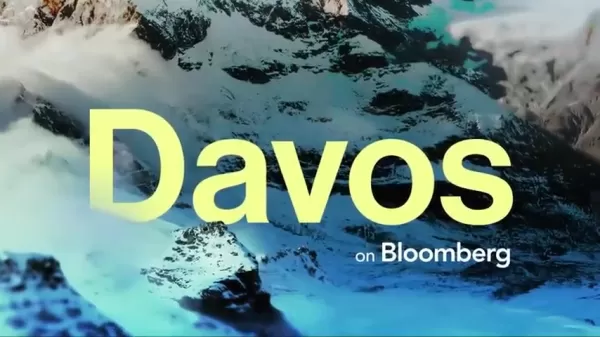
From Inauguration to Davos: Trump's Agenda Takes Center Stage
Trump's agenda for his new term, as seen in the video, was all about economic nationalism. He urged countries to manufacture in America or face tariffs, a message that resonated loudly with the Davos crowd. His protectionist stance, a throwback to his first term, sparked heated debates among global business leaders, many of whom feared for the stability of international trade. Trump's call for lower oil prices was another bold move, aimed at boosting the US economy but with significant implications for oil-producing countries. The video also showcased his inauguration, with family members like Ivanka Trump in attendance. The ripple effect of his policies was felt immediately at Davos, as leaders grappled with the new economic realities.
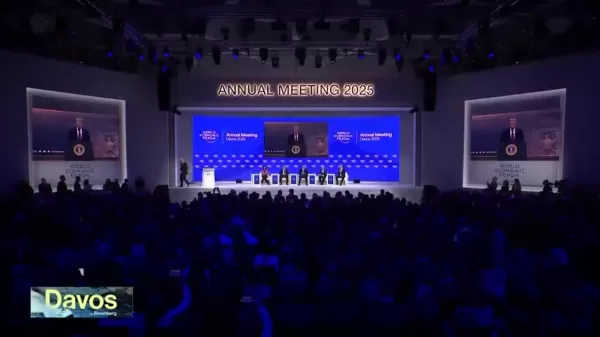
Navigating the 'Trump Doctrine': Reactions from World Leaders
The video captured a range of reactions from world leaders to Trump's renewed influence. Jenny Johnson of Franklin Templeton praised Trump's deal-making skills, while Vas Narasimhan of Novartis distinguished between policy and rhetoric. NATO Secretary General Mark Rutte saw value in Trump's push for NATO funding, albeit in his unique style. However, not everyone was on board; the Bank of Spain's governor expressed concerns about the growth implications of Trump's policies, and Spanish Prime Minister Pedro Sánchez warned against the dangers of trade wars. These varied responses highlight the global unease about the potential instability and economic challenges posed by Trump's policies.

The Importance of Long-term Thinking & Sustainability
Balancing Short-term Gains with Long-term Value Creation
Leaders at Davos emphasized the need for a long-term perspective in business and investment. Ruth Porat of Alphabet stressed the importance of enduring fundamentals and the need for a predictable regulatory framework. She warned against a patchwork of regulations and highlighted the risks of saying no to opportunities. Similarly, Spanish Prime Minister Pedro Sánchez underscored the importance of maintaining trade relations with the US, the UK, and the EU. The rhetoric around Trump's policies, as noted by Vas Narasimhan, was seen as potentially negative by some experts, with bold statements like Trump's interest in buying Greenland drawing attention.
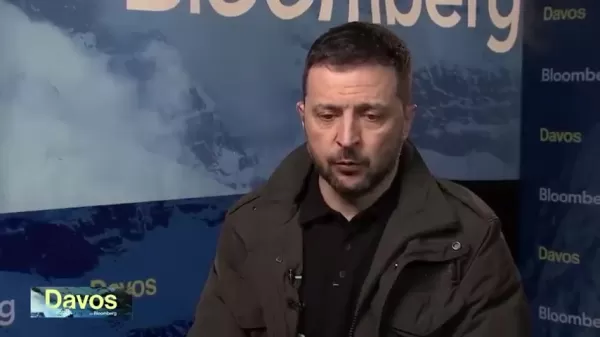
The Emerging World of AI and its Impact
The video delved into the transformative potential of AI across various sectors. One CEO reported a 15% increase in worker efficiency thanks to AI, while Arthur Mensch of Mistral AI predicted that the full integration of AI would take decades. The consensus was that AI would fundamentally change how we operate, with many traditional business models facing disruption. The question of how tech companies would monetize AI, possibly through subscription models similar to ChatGPT, was also discussed. The video highlighted the ongoing development of AI and its expected growth alongside blockchain technology.
Evaluating Trump's Economic Policies: A Balanced Perspective
Pros
- Potential for increased US economic growth through a more business-friendly and streamlined regulatory environment.
- Enhanced geopolitical leverage through strategic trade policies.
- Focus on transitioning from liquid to chemical markets.
Cons
- Risk of triggering trade wars and causing global economic instability due to protectionist measures.
- Concerns about Washington's potential to bypass existing trade agreements.
- Lack of commitment to current trade agreements.
FAQ
What were the main themes discussed at Davos 2025?
The main themes at Davos 2025 included the implications of Trump's return, the AI revolution, and shifts in the global economy. The forum also emphasized the need for international collaboration in the 'Intelligent Age'.
How did Trump's return influence the discussions?
Trump's virtual presence set the tone for discussions on economic nationalism, trade policies, and international security. His influence was deeply felt, with many conversations revolving around trade deals and tariffs.
What were some of the main economic concerns raised at Davos 2025?
Major concerns included the potential for trade wars, the impact of rising interest rates, and the need for policy stability to foster global economic growth. Leaders also expressed that trade wars were not in anyone's interest.
What role is AI expected to play in the future of business?
AI is expected to play a crucial role in the future of business, with leaders noting significant efficiency gains and the need for responsible integration.
How are business leaders approaching AI?
While there's enthusiasm for AI, leaders are approaching it with a strong focus on ethical considerations.
Related Questions
What is the long-term outlook of AI in business and markets?
AI is poised to revolutionize business by making processes faster, safer, and more cost-effective. Blockchain technology will also play a significant role in wealth management. As AI continues to evolve, human workers will need to adapt and integrate with these systems rather than be replaced. The full integration of AI into business is expected to take at least 20 years, and will likely be subject to stringent regulation. Ensuring regulatory clarity will be crucial for market success, with many opportunities in AI being influenced by regulatory frameworks.
Related article
 Google’s latest AI model report lacks key safety details, experts say
On Thursday, weeks after launching its latest and most advanced AI model, Gemini 2.5 Pro, Google released a technical report detailing the results of its internal safety assessments. However, experts have criticized the report for its lack of detail, making it challenging to fully understand the pot
Google’s latest AI model report lacks key safety details, experts say
On Thursday, weeks after launching its latest and most advanced AI model, Gemini 2.5 Pro, Google released a technical report detailing the results of its internal safety assessments. However, experts have criticized the report for its lack of detail, making it challenging to fully understand the pot
 Comprehensive Guide to Mastering Font Size in Adobe Illustrator
If you're diving into the world of graphic design and art, Adobe Illustrator is your go-to tool. It's packed with features that let you create visually stunning designs, and one of the key elements you'll be working with is typography. Getting the font size just right is crucial for both readability
Comprehensive Guide to Mastering Font Size in Adobe Illustrator
If you're diving into the world of graphic design and art, Adobe Illustrator is your go-to tool. It's packed with features that let you create visually stunning designs, and one of the key elements you'll be working with is typography. Getting the font size just right is crucial for both readability
 AI Dungeon Master: Exploring D&D with AI-Generated Presidents
Embark on an Unforgettable Dungeons and Dragons Adventure with AI-Powered PresidentsEver wondered what it would be like to dive into a Dungeons and Dragons campaign with former U.S. presidents as your party members? Well, buckle up because we're about to take you on a journey like no other, where ar
Comments (0)
0/200
AI Dungeon Master: Exploring D&D with AI-Generated Presidents
Embark on an Unforgettable Dungeons and Dragons Adventure with AI-Powered PresidentsEver wondered what it would be like to dive into a Dungeons and Dragons campaign with former U.S. presidents as your party members? Well, buckle up because we're about to take you on a journey like no other, where ar
Comments (0)
0/200

 April 27, 2025
April 27, 2025

 HaroldMiller
HaroldMiller

 6
6
Davos 2025 was a spectacle of snow-capped mountains, world leaders, and economic giants, but the real buzz was about the return of a familiar face: Donald Trump. His second inauguration as US President and his virtual address to the forum set the stage for a reevaluation of global trade, security, and the future of international relations. It was clear from the get-go that this wasn't going to be just another Davos. This article dives into the key discussions and insights from the event, exploring the impact of Trump's return, the AI revolution, and how global leaders are navigating this new era.
Key Points
- Trump's Comeback: Trump's second term as President was the elephant in the room, steering the conversation at the World Economic Forum.
- Economic Nationalism: Trump's push for tariffs and lower oil prices signaled a strong return to economic nationalism.
- Policy Environment: While some business leaders were hopeful about a pro-business US, others worried about the ripple effects of potential trade wars.
- Ukraine Concerns: President Zelenskyy stressed the importance of a victory for the US and its allies in the ongoing conflict with Russia.
- Global Cooperation: The theme 'Collaboration for the Intelligent Age' underscored the need for international teamwork to leverage AI and tackle global issues.
- AI Disruption: The rapid advancement of AI and its potential to transform industries and investment strategies was a hot topic.
- Ethical AI Governance: The forum highlighted the importance of responsible AI development and the ethical challenges it poses.
- Sustainability Goals: Leaders pushed for the integration of environmental and social factors into financial decision-making.
- Shifting Global Order: Discussions reflected on the challenges and opportunities arising from the changing geopolitical landscape.
The Resurgence of Trump and its Impact on Davos
Trump's Unmissable Presence at Davos 2025
The 2025 World Economic Forum in Davos was anything but ordinary. Even though Trump addressed the forum virtually, his influence was palpable. The video footage from the event captures the essence of how his return to the presidency shaped the discussions on global trade, energy policies, and international relations. Bloomberg's coverage noted that amidst the Swiss Alps, Trump's presence was undeniable. The usual Davos mix of snow, billionaires, and world leaders took on a new dimension with Trump's political comeback. His inauguration video added a layer of complexity to the forum's dynamics, signaling a shift in the political landscape that required everyone to rethink their strategies and alliances. This section explores how Trump's policies and statements echoed through Davos 2025, making it clear that he was still the talk of the town.

From Inauguration to Davos: Trump's Agenda Takes Center Stage
Trump's agenda for his new term, as seen in the video, was all about economic nationalism. He urged countries to manufacture in America or face tariffs, a message that resonated loudly with the Davos crowd. His protectionist stance, a throwback to his first term, sparked heated debates among global business leaders, many of whom feared for the stability of international trade. Trump's call for lower oil prices was another bold move, aimed at boosting the US economy but with significant implications for oil-producing countries. The video also showcased his inauguration, with family members like Ivanka Trump in attendance. The ripple effect of his policies was felt immediately at Davos, as leaders grappled with the new economic realities.

Navigating the 'Trump Doctrine': Reactions from World Leaders
The video captured a range of reactions from world leaders to Trump's renewed influence. Jenny Johnson of Franklin Templeton praised Trump's deal-making skills, while Vas Narasimhan of Novartis distinguished between policy and rhetoric. NATO Secretary General Mark Rutte saw value in Trump's push for NATO funding, albeit in his unique style. However, not everyone was on board; the Bank of Spain's governor expressed concerns about the growth implications of Trump's policies, and Spanish Prime Minister Pedro Sánchez warned against the dangers of trade wars. These varied responses highlight the global unease about the potential instability and economic challenges posed by Trump's policies.

The Importance of Long-term Thinking & Sustainability
Balancing Short-term Gains with Long-term Value Creation
Leaders at Davos emphasized the need for a long-term perspective in business and investment. Ruth Porat of Alphabet stressed the importance of enduring fundamentals and the need for a predictable regulatory framework. She warned against a patchwork of regulations and highlighted the risks of saying no to opportunities. Similarly, Spanish Prime Minister Pedro Sánchez underscored the importance of maintaining trade relations with the US, the UK, and the EU. The rhetoric around Trump's policies, as noted by Vas Narasimhan, was seen as potentially negative by some experts, with bold statements like Trump's interest in buying Greenland drawing attention.

The Emerging World of AI and its Impact
The video delved into the transformative potential of AI across various sectors. One CEO reported a 15% increase in worker efficiency thanks to AI, while Arthur Mensch of Mistral AI predicted that the full integration of AI would take decades. The consensus was that AI would fundamentally change how we operate, with many traditional business models facing disruption. The question of how tech companies would monetize AI, possibly through subscription models similar to ChatGPT, was also discussed. The video highlighted the ongoing development of AI and its expected growth alongside blockchain technology.
Evaluating Trump's Economic Policies: A Balanced Perspective
Pros
- Potential for increased US economic growth through a more business-friendly and streamlined regulatory environment.
- Enhanced geopolitical leverage through strategic trade policies.
- Focus on transitioning from liquid to chemical markets.
Cons
- Risk of triggering trade wars and causing global economic instability due to protectionist measures.
- Concerns about Washington's potential to bypass existing trade agreements.
- Lack of commitment to current trade agreements.
FAQ
What were the main themes discussed at Davos 2025?
The main themes at Davos 2025 included the implications of Trump's return, the AI revolution, and shifts in the global economy. The forum also emphasized the need for international collaboration in the 'Intelligent Age'.
How did Trump's return influence the discussions?
Trump's virtual presence set the tone for discussions on economic nationalism, trade policies, and international security. His influence was deeply felt, with many conversations revolving around trade deals and tariffs.
What were some of the main economic concerns raised at Davos 2025?
Major concerns included the potential for trade wars, the impact of rising interest rates, and the need for policy stability to foster global economic growth. Leaders also expressed that trade wars were not in anyone's interest.
What role is AI expected to play in the future of business?
AI is expected to play a crucial role in the future of business, with leaders noting significant efficiency gains and the need for responsible integration.
How are business leaders approaching AI?
While there's enthusiasm for AI, leaders are approaching it with a strong focus on ethical considerations.
Related Questions
What is the long-term outlook of AI in business and markets?
AI is poised to revolutionize business by making processes faster, safer, and more cost-effective. Blockchain technology will also play a significant role in wealth management. As AI continues to evolve, human workers will need to adapt and integrate with these systems rather than be replaced. The full integration of AI into business is expected to take at least 20 years, and will likely be subject to stringent regulation. Ensuring regulatory clarity will be crucial for market success, with many opportunities in AI being influenced by regulatory frameworks.
 Comprehensive Guide to Mastering Font Size in Adobe Illustrator
If you're diving into the world of graphic design and art, Adobe Illustrator is your go-to tool. It's packed with features that let you create visually stunning designs, and one of the key elements you'll be working with is typography. Getting the font size just right is crucial for both readability
Comprehensive Guide to Mastering Font Size in Adobe Illustrator
If you're diving into the world of graphic design and art, Adobe Illustrator is your go-to tool. It's packed with features that let you create visually stunning designs, and one of the key elements you'll be working with is typography. Getting the font size just right is crucial for both readability
 AI Dungeon Master: Exploring D&D with AI-Generated Presidents
Embark on an Unforgettable Dungeons and Dragons Adventure with AI-Powered PresidentsEver wondered what it would be like to dive into a Dungeons and Dragons campaign with former U.S. presidents as your party members? Well, buckle up because we're about to take you on a journey like no other, where ar
AI Dungeon Master: Exploring D&D with AI-Generated Presidents
Embark on an Unforgettable Dungeons and Dragons Adventure with AI-Powered PresidentsEver wondered what it would be like to dive into a Dungeons and Dragons campaign with former U.S. presidents as your party members? Well, buckle up because we're about to take you on a journey like no other, where ar







